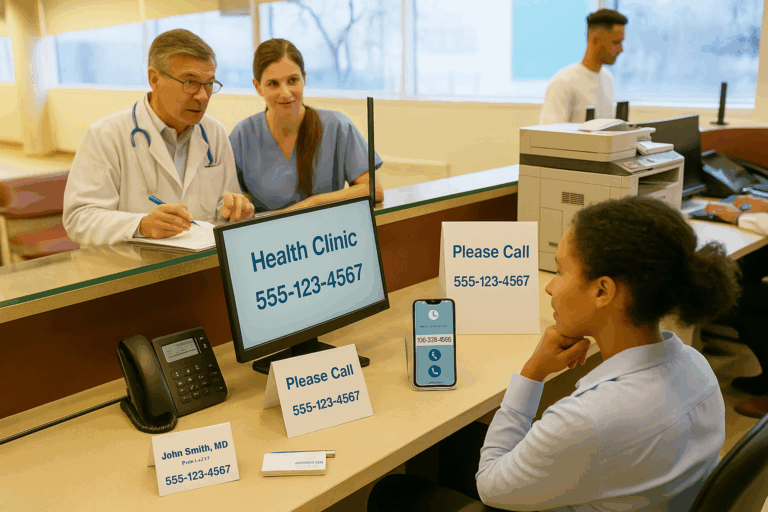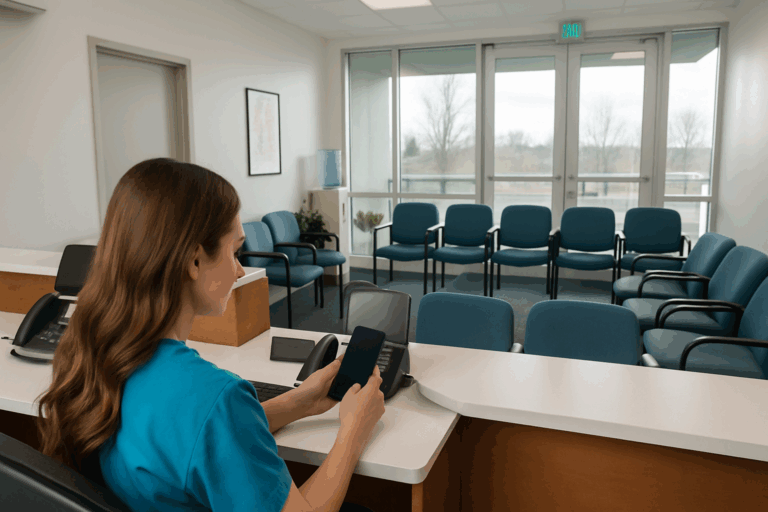When it comes to data security breaches, healthcare providers have a lot to lose.
Not only can these breaches cause system downtime and lost productivity for a healthcare organization (e.g. a physician’s office, clinic, hospital, etc.), but they also put sensitive patient information risk—leading to HIPAA violations that can result in costly fines and lawsuits against the care provider. (The cost of a cyberattack for a healthcare organization is $6.5 million, on average.) And that doesn’t even take into account all the future business that is lost due to a damaged reputation.
Threats like these are exactly why healthcare organizations hire IT professionals knowledgeable in cybersecurity to help them remove vulnerabilities from their technological infrastructures. And phone systems are part of these infrastructures.
Under HIPAA, healthcare providers have a responsibility to keep all protected health information (PHI) secure, and that includes patient information that may be shared through voicemail, text messages, faxes, provider notes, or any communication that results in stored data. When healthcare providers use Voice over Internet Protocol (VoIP) phone systems that do not properly encrypt and store data, these providers put both their patients and their own organizations at risk.
But when you’re a healthcare IT professional charged with selecting, deploying, and maintaining a communications system for your organization, you have to think about more than just HIPAA compliance.
You also have to think about the overall effectiveness of the technology.
To help you meet both standards for your organization, here are a few tips on how to find the right HIPAA compliant phone system platform for your organization. Before we dive into the nitty-gritty of HIPAA, let’s first look at efficiency.
What makes a phone system efficient for your organization?
How can you tell if a VoIP phone system is a good fit for your healthcare organization? You can start by asking yourself questions like…
- Will this system be easy for our doctors, nurses, and other medical and support staff to use on a day-to-day basis? Or will there be constant requests for support…or worse—security vulnerabilities that arise due to improper use of the system?
- Will this system help bring us up-to-standard with modern-day communication practices and help improve workflow? In other words, is it a cloud-based system? Will staff be able to easily use the platform from their mobile devices? Does the phone system include features like secure texting, email notifications, web-based faxing, and mailbox sharing that allow for more seamless communication with patients and within the organization?
- Is this system easy to integrate into our existing technological infrastructure? Does the phone system provider offer an API that will allow us to integrate the system with other platforms that we’re already using (e.g., our email exchange, instant-messaging platform, customer relationship management software, etc.)?
- Is this system built for a healthcare organization of our size? Can we scale the features and functionality of the platform up or down to meet our day-to-day operational needs and budget?
When comparing phone platforms, be ready to ask the tough questions and identify when a product isn’t the right fit.
Many healthcare providers invest in a new technology only to find that those systems do not meet the long-term needs of their medical office, clinic, or other healthcare facilities—causing the “solution” to drain valuable time, money, and productivity from their IT department and their organization at large…all while compromising the healthcare provider’s ability to remain HIPAA-compliant. That’s why efficiency must be carefully considered in the selection of any communications platform.
Measuring the phone system against the 6 pillars of HIPAA compliance
To properly protect patient information and keep your organization abiding by federal law, be sure to choose a phone system and provider that incorporates these Six Pillars of HIPAA Compliance:
- Physical security of PHI
- Encryption
- Training
- Product security / password protection
- Auditing
- Business Associate Agreement (BAA)
Here’s a breakdown of each pillar…
- Physical Security of PHI
Your phone system should be supported by storage architecture that is built to maintain all PHI data on encrypted hard drives. Servers maintaining this data should be managed in several geographic locations to mitigate against localized failures of one or more server facilities. These data silos should include any sources with PHI (e.g., voicemails, faxes, patient contact information, etc.).
- Encryption
Any modern healthcare provider is going to use a cloud-based, VoIP system for their phone platform—which means all data and files will be transmitted and stored within the cloud. To properly protect patient data, you will need a system that automatically encrypts this data, whether it’s at rest or in flight. Your platform should also use aggressive encryption key rotation strategies to maximize safeguards against unauthorized access.
- Training
Research shows that 78% of employees demonstrate a lack of preparedness, training and resources to protect the privacy and security of sensitive information like patient data. That’s why it’s critical for all your employees and any third-party vendors you work with who have access to your patient information to be properly educated on how to handle this data. This means your phone phone system provider should undergo regular training on the latest healthcare security laws and practices.
- Product Security/Password Protection
Any software system that contains PHI must be protected with adequate password security. This includes premise-based solutions, as well as cloud-based solutions. Appropriate password standards, including strong character requirements and length, should be enforced to ensure only those with approved security clearance are able to access services and systems that contain PHI.
- Auditing
To help keep your organization’s phone system HIPAA-compliant, your network systems, and data custody must undergo external audits on an annual basis. This should include auditing of deployment and maintenance practices. Additionally, routine automated audits should be conducted by your phone system provider on an ongoing basis to ensure access is limited to authorized personnel only.
- Business Associate Agreement (BAA)
When a healthcare organization works with a vendor that has access to patient information through the business relationship, they’re required under HIPAA to enter into a formal business associate agreement (BAA). Through this agreement, the vendor agrees to adhere to certain standards that allow for the full protection of patient information under the law.
Vendors that provide cloud-based, private branch exchange (PBX) phone systems definitely fall under this position. As a result, your phone system provider should work with you to establish a BAA.
Finding the HIPAA-compliant phone system that offers it ALL
Now that you know what to look for in a communications system, it’s time to begin researching your options for your healthcare organization.
Fortunately, you don’t have to look far.
RingRx is a next-generation, all-in-one, cloud-communications platform that meets all the criteria discussed in this post. The RingRx system is designed to simplify and improve patient-staff communications for healthcare provider organizations of all sizes—from small, independent medical practices to multi-location clinics, regional medical centers, hospitals, and healthcare business associates.
Not only is RingRx completely HIPAA-compliant, but it’s an all-in-one platform that helps healthcare providers maximize efficiency, minimize errors, and reduce costs.
To find out how RingRx can help you better secure and support your organization, contact our team here for more information.




